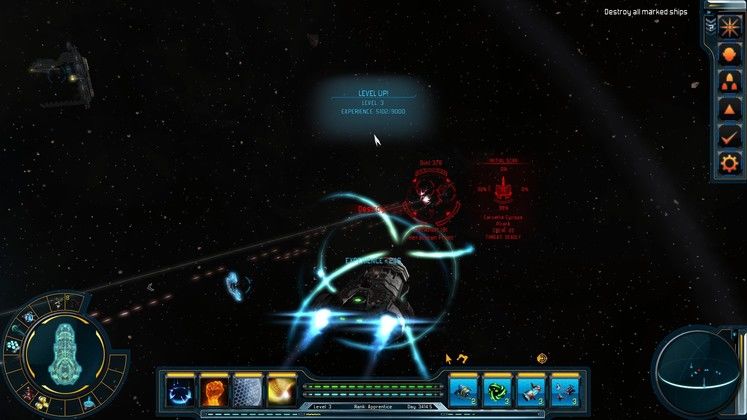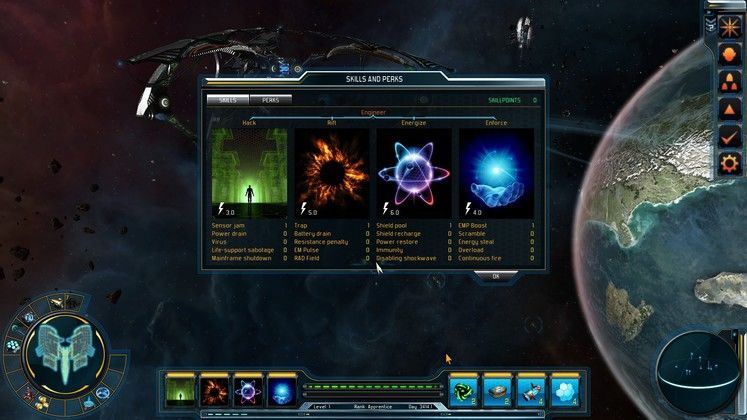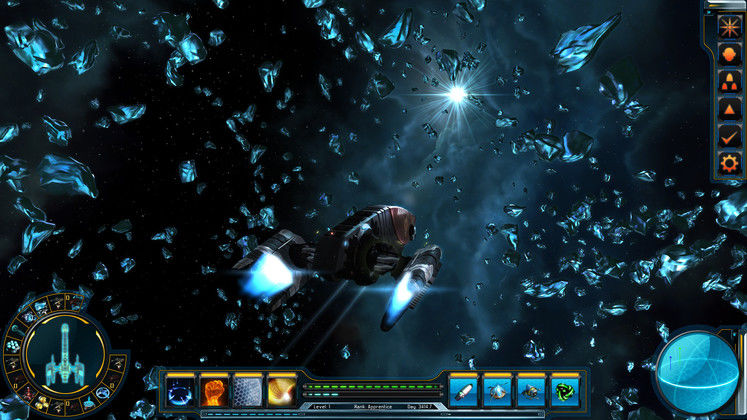A word of advice: the best fun to be had is in Freeroam mode, and not in the largely uninteresting and not particularly well-acted story. The game itself essentially admits this, when after the first mission it asks again whether you wouldn't rather avoid all this nonsense and switch to the sandbox mode. Play through the campaign and you'll find an entry-level sci-fi revenge tale that never really engages, past a few missions that introduce useful gameplay mechanics. There's lots of portentous references to factions and concepts that are never really explained – I still don't fully grasp the foundations of SG2's world, even after several hours of listening to uninteresting characters blather on about it. So don't bother too much with the campaign, just go out into the universe to craft your own stories.
 |
| Don't fancy getting your hands dirty? Just get your gunner crew to take down the enemy for you |
And it's an intimidatingly big place to explore. The map is colossal, spanning countless space stations and planets, all of which you can dock at to repair, refit and resupply. Travelling across these vast regions can be made much quicker by using several 'T-Gates', essentially huge hyperspace lanes spread across the galaxy. Though they zip you across the galaxy in short order, they're prohibitively expensive, which means early on you're restricted to only a few zones. Slowly you'll begin to pile up enough cash to use the gates or even buy your own T-Drives, letting you head off to the farthest reaches of the uncharted zones. Exploring these dangerous regions, filled with pirates and valuable resources, is one of the most satisfying elements of the game, backed by a lovely electronic score that perfectly accompanies the sights and dangers of the deep galaxy.
You start out with a simple light attack ship, with a couple of weapons and fairly limited hull space. It's enough to fend off a few bandits and do a little freelance shuttle work, but won't stand up to much punishment. You need more firepower and a bigger cargo hold, which means you need cash. Jobs pop up on your galaxy map, and completing them slowly earns you enough money to upgrade, first your weapons and gear and then your ship itself. Not just assassination or bounty-hunting missions either. If you want to play a pacifist that's fine, just stick to taxiing VIPS around or repairing damaged beacons. A functional if not particularly deep economy also offers a chance for traders and smugglers to make their fortune, though endlessly ferrying goods back and forth isn't really my idea of fun.
There's a decent amount of these missions to attempt, but they veer rather too closely to MMO-style grinding for my comfort. Ships can set you back a million credits or so, which means you'll have to complete a tonne of not-that-interesting missions to save up for the good stuff. This repetition leaves Starpoint Gemini 2's otherwise impressively large open universe feeling a bit smaller and less interesting than it should be.
Still, there's fun to be had making your own way in the world. Want to be a despicable pirate, preying on weak transport ships and poorly defended mining stations? That's fine, knock yourself out. It's actually (whisper it) the best way to make quick cash, which meant that, despite my best intentions, it swiftly became my main source of income. My shiny new battleship was paid for with many innocent lives. Fair trade in my opinion.
 |
| Each class has a number of special abilities that can be customised to fit your playstyle. The Engineer is all about messing with your opponent's systems |
At the start of the game you choose from one of three classes, the Commander, the Gunner and the Engineer. Each offers a few unique skills and bonuses in combat, and adventuring across the galaxy nets you skill points you can use to further customise your captain. Don't expect any unique talents that let you do outlandish things, it's mainly percentage increases to certain skills. Still, it does let you nudge your virtual captain in a particular direction, from a merchant trader with powerful engines ready to zip away at the first sign of enemy contact, to a pirate warchief who specialises in high-damage plasma weaponry and vicious boarding actions.
Rather than twitch combat, SG2 aims for something closer to an RTS. You can choose to aim your turrets manually, but you can also choose to handle the flying while your crack gunners open fire. There's a bunch of different weapons and options; your usual mix of lasers, plasma cannons, rail-guns, and several flavours of limited ammunition missiles. New toys can be looted from conquered vessels, or bought at one of the countless space stations and planets dotted around the map. You can also grab a few other toys while you're shopping, like swarms of salvage robots, shield boosters or even cloaking devices. These are expensive, but invaluable when taking on tougher enemies.
My favourite tactic, as a cold-blooded pirate, is to hire a bunch of mercenary soldiers as my boarding crew. Pick a vulnerable ship, wear it down and then send your jackbooted thugs over to subdue the crew and take over the helm. Rather than picking through scraps of destroyed cruiser, you're now towing a largely intact vessel, ready to be sold at the nearest station for big bucks. It's options like these that give a welcome shot in the arm to the otherwise rather functional and unspectacular combat.
As varied as your ship-to-ship options are, most fights boil down to two or three enemies hammering on you while you sling your heavy weapons back their way. Even when you're piloting a bulky heavy cruiser or battleship, the game lacks those big set-piece naval battles with tonnes of ships on-screen. I was hoping you could manipulate the various factions to set up these bigger battles, but the faction system largely boils down to making friends with one side while annoying the other. You've got this huge open playground to explore, but you can't really change the foundations of it as much as I'd hoped.
 |
| Though SG2 isn't a particularly impressive game visually, it does have some very pretty sights to see |
That's the main thing holding Starpoint Gemini 2 back, really. You level up, you improve your skills, but you never really feel like your actions are making a real impact on the world around you. I'd like to see a developing universe, with ships and factions that pursue their own goals rather than merely sending a few enemies after you when you enter their turf, an economy that you can really dig your teeth into. There's lots going on in the game, but it never really reacts to your presence in a dynamic and interesting way.
STARPOINT GEMINI II VERDICT
Maybe Starpoint Gemini 2’s universe doesn’t always feel as alive as it could, but it’s still an enjoyable place to spend your time. I love the freedom, the lack of restriction on what you can or can’t do. The touchstone influences here are clearly games like Freelancer and Privateer, and SG2 gives you that same sense that the galaxy is your playground. The campaign isn’t up to much, the interactions between various factions are simplistic and missions occasionally feel repetitive, but the game largely nails that feeling of being a grizzled starship captain who doesn’t play by the rules, making his living any way he can. And also that feeling of being in charge of a fleet of warships laying waste to the innocent. Both are pretty fun.
TOP GAME MOMENT
Getting your first heavy ship, piling on the weaponry and going out in search of juicy targets.




